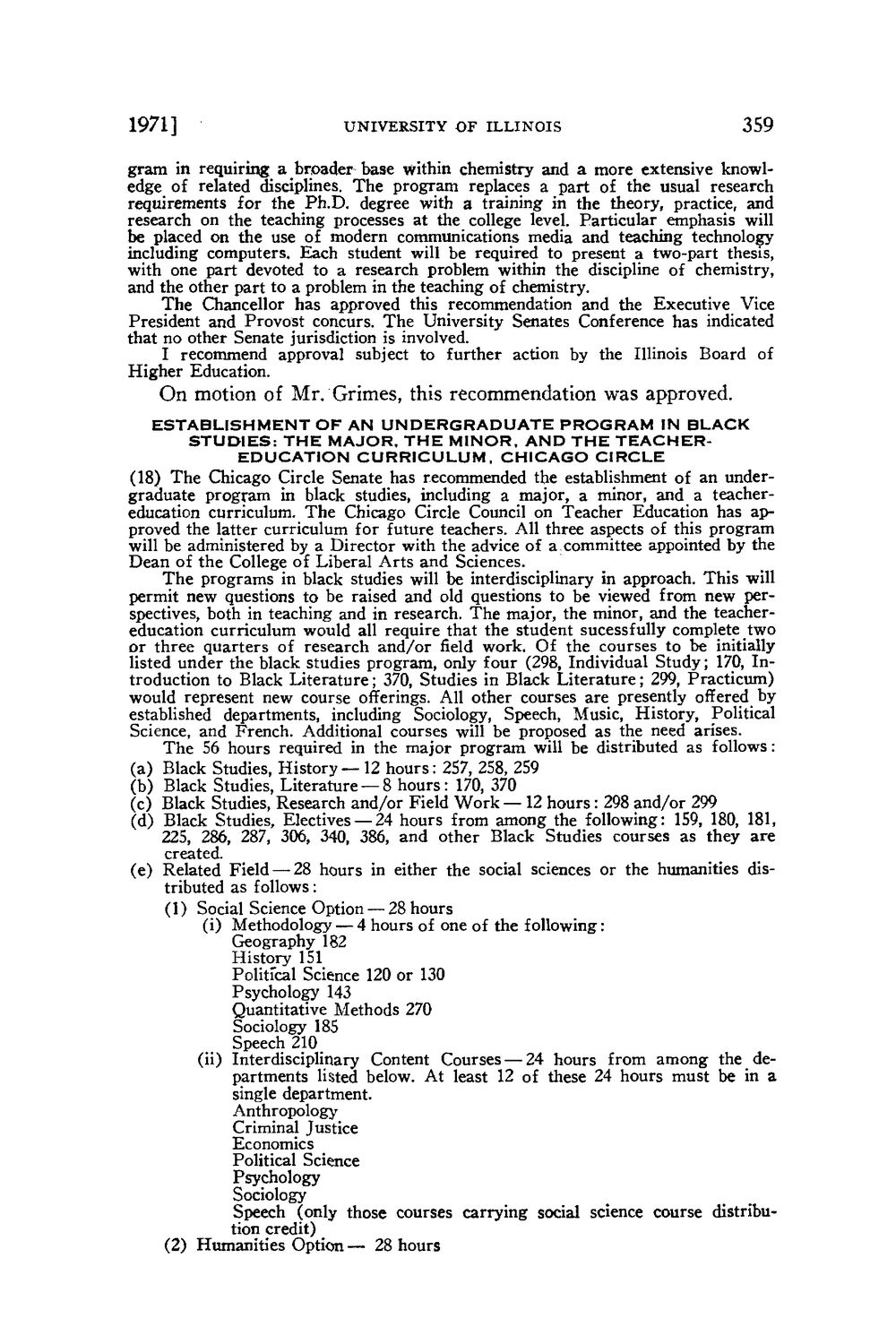| |
| |
Caption: Board of Trustees Minutes - 1972
This is a reduced-resolution page image for fast online browsing.

EXTRACTED TEXT FROM PAGE:
1971] UNIVERSITY OF ILLINOIS 359 gram in requiring a broader base within chemistry and a more extensive knowledge of related disciplines. The program replaces a part of the usual research requirements for the Ph.D. degree with a training in the theory, practice, and research on the teaching processes at the college level. Particular emphasis will be placed on the use of modern communications media and teaching technology including computers. Each student will be required to present a two-part thesis, with one part devoted to a research problem within the discipline of chemistry, and the other part to a problem in the teaching of chemistry. The Chancellor has approved this recommendation and the Executive Vice President and Provost concurs. T h e University Senates Conference has indicated that no other Senate jurisdiction is involved. I recommend approval subject to further action by the Illinois Board of Higher Education. On motion of Mr. Grimes, this recommendation was approved. ESTABLISHMENT O F AN UNDERGRADUATE PROGRAM IN BLACK STUDIES: THE MAJOR, T H E MINOR, AND T H E TEACHEREDUCATION C U R R I C U L U M , CHICAGO CIRCLE (18) The Chicago Circle Senate has recommended the establishment of an undergraduate program in black studies, including a major, a minor, and a teachereducation curriculum. The Chicago Circle Council on Teacher Education has approved the latter curriculum for future teachers. All three aspects of this program will be administered by a Director with the advice of a committee appointed by the Dean of the College of Liberal Arts and Sciences. T h e programs in black studies will be interdisciplinary in approach. This will permit new questions to be raised and old questions to be viewed from new perspectives, both in teaching and in research. The major, the minor, and the teachereducation curriculum would all require that the student sucessfully complete two or three quarters of research a n d / o r field work. Of the courses to be initially listed under the black studies program, only four (298, Individual Study; 170, Introduction to Black Literature; 370, Studies in Black Literature; 299, Practicum) would represent new course offerings. All other courses are presently offered by established departments, including Sociology, Speech, Music, History, Political Science, and French. Additional courses will be proposed as the need arises. The 56 hours required in the major program will be distributed as follows: (a) Black Studies, H i s t o r y — 12 hours: 257, 258, 259 (b) Black Studies, Literature — 8 hours: 170, 370 (c) Black Studies, Research and/or Field W o r k — 12 h o u r s : 298 and/or 299 (d) Black Studies, Electives — 24 hours from among the following: 159, 180, 181, 225, 286, 287, 306, 340, 386, and other Black Studies courses as they are created. (e) Related Field—-28 hours in either the social sciences or the humanities distributed as follows: (1) Social Science Option — 28 hours (i) Methodology — 4 hours of one of the following: Geography 182 History 151 Political Science 120 or 130 Psychology 143 Quantitative Methods 270 Sociology 185 Speech 210 (ii) Interdisciplinary Content Courses — 24 hours from among the departments listed below. At least 12 of these 24 hours must be in a single department. Anthropology Criminal Justice Economics Political Science Psychology Sociology Speech (only those courses carrying social science course distribution credit) (2) Humanities Option — 28 hours
| |